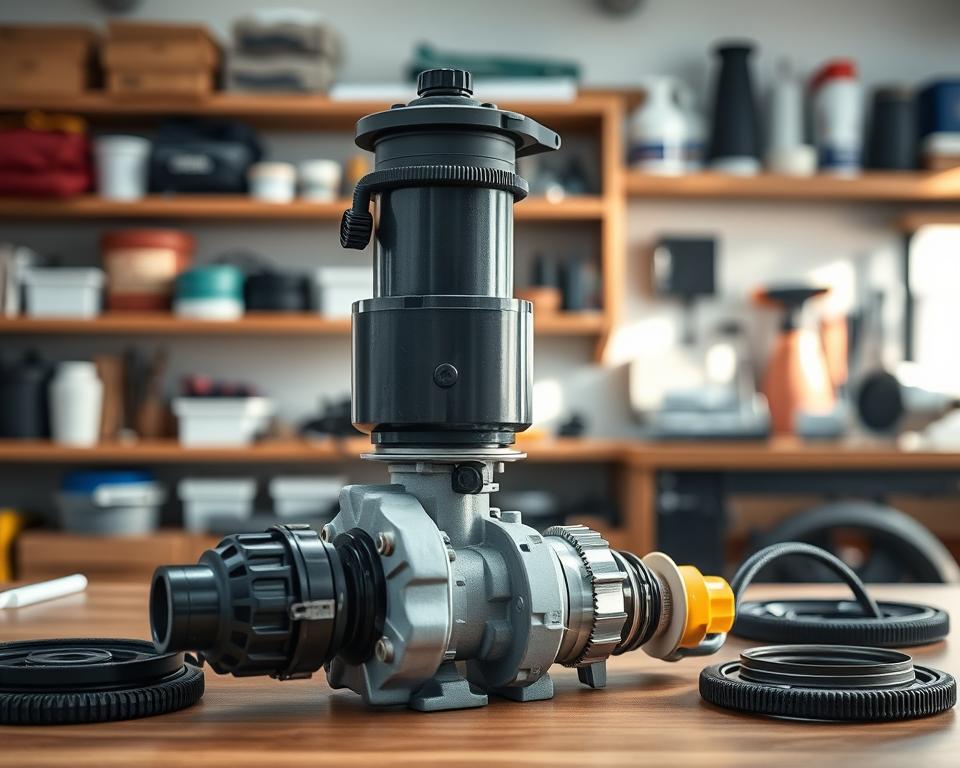Camper Septic Pumping Guide: Essential Tips
Ever considered what takes place if you neglect your RV’s septic system? Imagine the disaster of waking up to a pungent smell and a failing sewage unit while camping. Routine camper septic pumping and waste management are critical to a trouble-free journey. The following guide walks through RV sewage disposal, motorhome waste removal, and camp toilet tips. With knowledge of your RV’s septic unit, you’ll steer clear of problems and maximize your excursions.
Major Insights
- Understanding your RV septic layout is vital for correct maintenance.
- Consistent camper septic pumping can prevent costly repairs.
- Understand the proper practices for RV sewage disposal.
- Leverage professional services like All in Sanitation for efficient waste management.
- Avoid odors and clogs with routine checks and maintenance.
How Your RV Septic System Works
Learning how your RV septic system works is vital to managing waste efficiently – RV septic removal. This system includes three main tanks: the primary waste tank for toilet waste, the gray reservoir for sink and shower water, and the freshwater tank. Drain pipes, 50 mm for sinks and 75 mm for toilets, facilitate waste movement. Understanding these elements is vital for routine upkeep and prompt waste removal.
The black tank is vital for sewage management in an RV. It requires routine emptying to ward off overfills and bad smells. Using a recreational vehicle septic service for this task can prolong your system’s lifespan. The gray tank also requires attention to avoid clogs from stagnant water.
Grasping the intricacies of your RV septic system helps you to manage it better. Routine checks and cleanings not only prolong your RV’s life but also reduce health hazards from septic failures.
The Importance of Camper Septic Pumping
Regular camper septic pumping is essential for your RV’s waste management system. Skipping pumping needs can result in clogs and backups. These issues not only hamper your system but also jeopardize the environment by contaminating local ecosystems.
Employing professional sanitation services delivers safe waste disposal. Companies like All in Sanitation offer dependable camper septic pumping. This supports your system and safeguards the environment. A properly cared-for septic system creates a cleaner, safer environment for campers and nature lovers.
Bottom line, keeping up with septic pumping heads off pricey repairs and ensures a better camping experience. Proactive waste management benefits personal health and the earth, underscoring its importance for RV owners.
Optimal Pumping Schedule for RV Septic
The frequency you must pump your RV’s septic reservoir greatly affects its performance. It hinges on how many people are using it and the capacity of the reservoir. It is generally advised to empty the primary waste tank every three to five days. If you wait too long, waste can harden, making it harder to clean out.
Tracking tank levels is crucial for maintaining your RV’s waste system. Aim to dump the waste when the tank is about two-thirds full. Overfilling can result in spills, nasty smells, and costly damage. Routine maintenance and immediate attention to the waste levels secure a stress-free journey.
Emptying RV Tanks: Best Practices
Properly emptying your RV tanks avoids undesirable scenarios. Always start by draining the black tank, followed by the gray tank. This method provides minimal contact with waste, enhancing hygiene.
It’s key to use a high-quality sewer hose. A quality hose cuts spills and enhances safety during waste disposal. After emptying, completely flushing the primary waste tank is essential.
For a comprehensive clean, employ a built-in black tank flush or a reservoir rinser. These tools reliably dislodge residues, securing the reservoir is properly sanitized.
Choosing the right disposal sites is critical for responsible waste management. If available, use designated dump stations for RV waste water disposal. Companies like All in Sanitation also provide mobile pump-out services, adding convenience for RV users.
How to Dump RV Waste Properly
Dumping waste from your RV is an critical task that requires careful attention to ensure a smooth process. First, emptying the primary waste tank, which holds solid waste. Once the primary tank is emptied, move on to the gray reservoir. This method efficiently rinses the sewage hose, decreasing residue and odor.
Before you connect the cassette toilet hose, carefully check your waste hose’s connections to stop leaks. A tight attachment protects your equipment and ensures a clean environment for camper holding tank pumping. Upon completion of dumping, make sure the valves are securely closed prior to disconnecting any hoses.
Dumping can be completed either at specialized dump stations or at sites with full hookup facilities. Both methods need following proper procedures to ensure hygiene and efficiency in RV waste management.
How to Stop Odors and Clogs
To prevent unpleasant smells, RV septic systems call for proper upkeep. Owners should leave their reservoirs adequately filled with water. Choosing RV-safe toilet paper is important to preventing blockages. It assists with the appropriate breakdown of waste. Periodically adding enzyme-based treatments greatly boosts waste management.

Reviewing the vent pipe periodically is essential to prevent clogs and interior odors. Using routine cleaning practices, like systematic flushing, can maintain the camping atmosphere fresh and inviting. This secures a pleasant experience for all RV campers.
Typical Errors in RV Septic Management
Many RV owners unknowingly make errors with their septic systems. Becoming aware of these mistakes improves RV waste water disposal. A common error is flushing items that don’t break down easily, causing significant clogs and disrupting the system’s function.
Letting solids build up due to skipping flushes is another issue. Infrequent maintenance leads to buildup, requiring expensive repairs. Bear in mind, regular attention saves both time and resources.
The following list lists common items that should not be flushed:
- Wipes
- Feminine hygiene products
- Certain types of toilet paper
Avoiding these errors and employing safer RV septic management enables travelers to appreciate their journeys without facing unnecessary septic difficulties.
| Mistake | Consequences | Prevention |
|---|---|---|
| Flushing Non-biodegradable Items | Clogs and blockages | Use only biodegradable toilet paper and proper disposal methods |
| Infrequent Tank Flushing | Solid accumulation and odors | Schedule regular flushing and maintenance |
| Ignoring Manufacturer Recommendations | System inefficiencies | Follow guidelines provided in the RV manual |
When to Get a Professional Pump-Out
Knowing when to arrange mobile home septic pumping is crucial. It prevents major problems later. Symptoms like slow drains, unexplained smells, or visible waste indicate a professional might be needed.
Lengthy stays or heavy use of your RV generate more waste than usual. A professional service like All in Sanitation can tackle these issues. They verify your reservoir is properly cleaned, preventing clogs. Consistent maintenance prevents future hassles, improving your RV experience.
Regular Maintenance for Long-Term Care
Regular maintenance is essential to boosting the life of your RV septic system. A steady RV septic service routine ensures long-lasting function and top performance. This includes not just the deep cleaning of reservoirs but also checking seals and cleaning the system thoroughly to prevent problems.
Incorporating these practices into your camping habits helps in managing residue buildup, improving waste disposal. Here’s what you should routinely do:
- Clean reservoirs thoroughly every few months.
- Inspect seals for wear and tear to avoid leaks.
- Sanitize the system to get rid of bacteria and odor.
- Check hoses and connections for damage.
Executing these steps in advance helps RV owners prevent costly repairs later, ensuring a smooth camping journey. Proper septic system maintenance boosts your outdoor adventures, making them more pleasant.
Spreading Waste-Wise Knowledge
Guiding RVers proper waste management is vital for a sustainable environment at campgrounds. Emphasizing the right habits can prevent issues like clogs and nasty odors.
To raise awareness, posting eye-catching educational signs is important. Such signs should plainly state what can and cannot be thrown into sewer systems, minimizing errors.
To further educate, campground owners might host workshops on sanitation. These would provide hands-on demonstrations on correct waste management. Passing out brochures and flyers also assists underline the need for responsible disposal. Learning the correct procedures boosts the camping experience for everyone.
To Conclude
Reliable camper septic pumping and thoughtful RV sewage disposal are vital for a better outdoor experience. Regular maintenance and learning how your septic system operates are key. They guarantee a camping trip without hassles. Employing best practices enables stop issues like clogs and bad smells, elevating your enjoyment of nature.
Collaborating with trustworthy services such as All in Sanitation offers expert assistance when you need it. It maintains your RV’s septic system working well and defends the environment. Guiding other RVers about important sanitation practices cultivates a community that respects cleanliness and the health of our ecosystem. This opens a pathway for adventures that are both rewarding and environmentally responsible.
Understanding the details about camper septic pumping and employing correct RV sewage disposal techniques enables you reconnect with nature without neglecting cleanliness. We should promote awareness and responsibility within the RV community. Collectively, we can make our outdoor spaces cleaner and more inviting for all.


